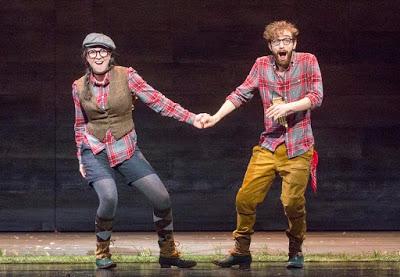by Paul J. Pelkonen

Next they'll be buying a stroller. Theo Hoffman (right) and Kara Sainz as Papageno and Papagena
in Act II of Die Zauberflöte at Juilliard. Photo by Richard Termine for the Juilliard School.
The staging, designed by Grace Laubacher was refreshing and simple, shorn of the pyramids, stars and moons that are so often used to underline this opera's roots as a recruiting tool for the Viennese Masonic lodge that claimed both Mozart and his librettist Emmanuel Schickenader as members. Here, Tamino (tenor Miles Mykkanen) is still striving to join Sarastro’s brotherhood. The twist: the priests were presented as successful bankers, deciding whether to accept the raffish Tamino who looked like the executive of a Silicon Alley start-up. Mr. Mykkanen’s quest is accompanied by a sweet, lyric instrument with pointed high notes and a pleasant, if slightly neutral stage presence.
Accompanying Tamino: the bird-catcher Papageno, played by Theo Hoffman as a Brooklyn hipster complete with horn-rims, checked shirt and regulation beard. Mr. Hoffman burst into the opera from the house, chasing prop birds that were flown from fishing poles above the audience. He played the role with charm and a warm baritone that points the way to good things in his future, using gesture and expression to add the necessary ad-libs without mugging through the role. He was helped by the choice of the original German text, with the arias presented complete and some judicious cuts to the spoken dialog.
Ms. Birnback solved a number of the dramatic problems of this show through unconventional means. The wood of the opening was a very Brooklyn-like back alley, with the Queen of the Night coming down a set of fire stairs and Tamino chased by animated shrubbery instead of a dragon. (Incidentally, the shrubs were animated by the spears of the Three Ladies, suggesting that the whole incident was some sort of set-up.) The three entrances to the Priests' temple had a broken doorknob, a faulty lintel and finally, a door that opened to emit the Speaker. And the long Masonic testing of the second act was all staged in one room, giving the feeling of what it indeed is, a hazing ceremony to determine if Tamino, Papageno and finally Pamina have what it takes to move to a better address.
The object of their quest was of course, Pamina. Soprano Christine Taylor Price made an early entrance, standing in the frame of her picture and thus making "Die bildnis" a kind of serenade. The libretto leaves her character a little vague, giving Ms. Price room to rework Pamina as a disaffected and depressive princess, the perfect candidate for recruitment into Sarastro's finance-obsessed cult. Her "Ach, ich fuls" in Act II was stunningly sung--the sound of her confused and lost little girl becoming a mature woman in her choice of Tamino,
Pamina is often overshadowed by the ten minutes and two arias that belong to the Queen of the Night. Here, soprano Erin Redpath cut a stunning figure with her long red hair suggesting Jean Grey of the X-Men in her turn as Dark Phoenix. She sang all the high notes in both arias, choosing short note values but nailing the cruel series of high Fs that Mozart inflicts on the soprano. Her Three Ladies were a comic highlight, although Avery Amareau mimed her way through the role, which was sung from the pit by Amanda Lynn Bottoms with a firm and resonant tone. The Three Boys (Christine Oh, Sophie Kamiksni and Kelsey Lauritano) were reimagined as a trio of giggling Japanese schoolgirls in matching kogyaru outfits, entering with Wheelies on their feet. Mention must be made here of Kara Sainz' high-energy performance as Papagena, which added adrenaline to the second act.
As Sarastro, bass Önay Köse was most effective, with real stage presence and an orotund voice. The Speaker was sung by Tesele Kerriane, a similarly effective presence who functioned like Sarastro’s bookkeeper. The long initiation sequence all took place in the same room, solving a lot of stage problems and putting Tamino and Papageno through a long series of fraternity-like hazing events. This made Monostatos (Alexander McKissick) something of an afterthought, though the Moorish overseer was played with a refreshing lack of racial overtones.

